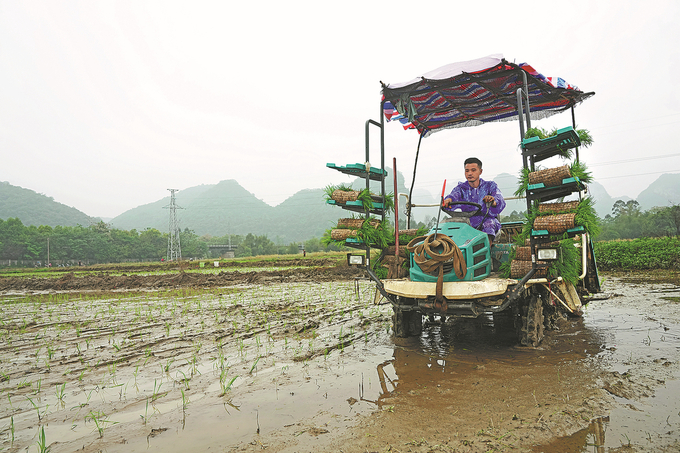November 25, 2025 | 20:23 GMT +7
November 25, 2025 | 20:23 GMT +7
Hotline: 0913.378.918
November 25, 2025 | 20:23 GMT +7
Hotline: 0913.378.918

A farmer drives a rice planter in Rongshui, Guangxi Zhuang autonomous region, on Tuesday. Photo: Long Tao/For China Daily.
Authorities are pushing to increase the adoption of high-yield crop varieties and better farming techniques as part of the next-phase efforts to raise agricultural output.
The practices used in agriculturally advanced countries show there's still huge potential in China, Liu Xin, director of the Office of the National Crop Variety Certification Committee, said on Tuesday.
Survey data showed that in experimental settings, output of the nation's homegrown soybean varieties ranged from 2.23 to 3.54 metric tons per hectare in 2021, and that of corn was 8.47 to 15.6 tons per hectare.
The outputs are close to or even surpass counterparts in the United States, he told a news conference in Beijing.
However, the actual yield for homegrown species is only about 70 percent of that in a lab environment, or 60 to 70 percent when compared with actual output in the US.
"By adopting new varieties and technologies, yields have the potential for further growth, and the gap between trial and actual yields will be narrowed," said Liu, who is also deputy director of the National Agricultural Technology Extension Service Center.
He made the remarks at a news conference in Beijing, which was held to promote a catalog of crop varieties for promotion. The catalog was released by the Ministry of Agriculture and Rural Affairs in February.
Speaking at the event, Yang Haisheng, deputy director of the ministry's planting administration bureau, said that food supply in China will remain tight in the long term due to increasing demand and limited arable land resources.
"It has already become difficult to bolster food production by expanding growing areas, so the focus must be turned to promoting the yield of a given plot of land," he said.
As part of the effort, promotion of high-yield species must be fast-tracked. Efforts will be made to raise the output of species widely grown by methods such as popularizing better planting techniques and machinery, in the hope of narrowing the gap between actual output and that of crops being grown under experimental conditions, Yang said.
Yang said that seed-breeding efforts have accelerated in recent years, and a number of quality food varieties have been promoted.
A downside of having more options is that they can actually create problems for farmers. "Because of that, many have called for the release of a catalog to guide the breeding effort and help farmers choose the right species," he said.
The catalog, the first of its kind in China, features 10 crop varieties including rice, wheat and corn, and a total of 241 subvarieties.
Tapping the potential of a given plot of land is a policy priority laid out in the No 1 Central Document this year. The document is the first policy statement released annually by the Communist Party of China Central Committee and the State Council, China's Cabinet, and has long served as an indicator of government priorities.
Since the founding of the People's Republic of China in 1949, the country's annual grain output has risen from 100 million tons to 650 million tons, and the average yield has increased from 1 ton per hectare to 5.8 tons thanks to the introduction of many improved varieties. "Crop varieties have undergone six to eight generations, and new ones have played a crucial role in increasing grain production," Liu said.
The contribution rate of improved varieties to yields in China is only 45 percent, whereas the number is generally over 60 percent in the US and in Europe, he noted.
With the increasing application of breeding technologies such as biotechnology, Liu said: "There is still huge potential for cultivating new varieties and more seed options."
(Chinadaily)

(VAN) Brazil's COP30 presidency pushed through a compromise climate deal on Saturday that would boost finance for poor nations coping with global warming but that omitted any mention of the fossil fuels driving it.

(VAN) Poultry farmers in the UK have been warned that they could face one of the worst winters yet for bird flu.

(VAN) Prices of main-crop paddy have risen sharply, with jasmine rice hitting 16,100 baht per tonne — the highest level in years.

(VAN) In Brazil, FAO unveiled a series of reports and initiatives showing how sustainable agrifood systems are a solution to the climate crisis.

(VAN) With names like neodymium and dysprosium, rare-earth elements sound exotic — and their perceived scarcity has only added to the mystique.

(VAN) In a new study published in Trends in Biotechnology, researchers used a gene-editing technology called CRISPR to increase a fungus's production efficiency and cut its production-related environmental impact by as much as 61%- all without adding any foreign DNA.

(VAN) A top official in Beijing’s Cop delegation says China is committed to clean energy – but US’s absence is a problem.